Andrei Tarkovsky
Bio
Andrei Arsenyevich Tarkovsky (Russian: Андрей Арсеньевич Тарковский; April 4, 1932 – December 29, 1986) was born in the village of Zavrazhye in Ivanovo Oblast. His father was one of the most important Russian poets Arseny Alexandrovich Tarkovsky, native of Kirovohrad, Ukraine, and his mother; Maria Ivanova Vishnyakova, a graduate of the Maxim Gorky Literature Institute worked as a proof-reader.
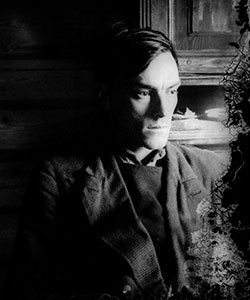
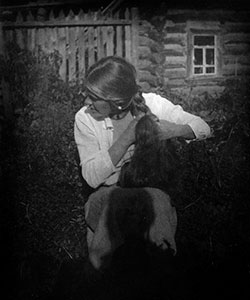
Tarkovsky spent his childhood in Yuryevets. In 1937, his father left the family. For Andrei it was a tragic event which affected him greatly. Tarkovsky stayed with his mother, moving with her and his sister Marina to Moscow, where she worked as a proofreader at a printing press. In 1939, Tarkovsky enrolled at the Moscow School № 554. During the war the family evacuated to Yuryevets, living with his maternal grandmother. In 1943, the family returned to Moscow. Tarkovsky's father went to the front when the war started and returned as an invalid, with an amputated leg.
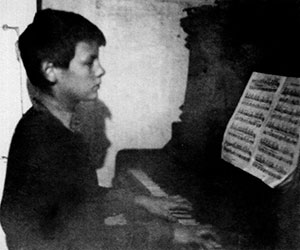
Tarkovsky mother wanted her son to be educated in the field of art and music. He learned piano at a music school and attended classes at an art school. He was interested in literature and especially in poetry. The family lived in the center of Moscow, on Shshipok Street in the Zamoskvorechye District in Moscow.
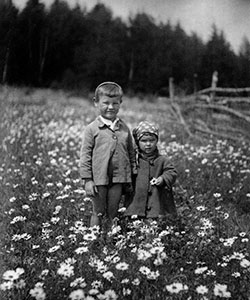
Many themes of his childhood - the evacuation, his mother and her two children, the withdrawn father were later reflected in his film The Mirror.
After high school graduation, from 1951 to 1952, Tarkovsky studied Arabic at the Oriental Institute in Moscow. Soon he lost interest in this specialization and did not finish his studies. He participated in a research expedition to the river Kureikye near Turukhansk in the Krasnoyarsk Province. During this time in the Taiga Tarkovsky decided to study film.
Upon return from the research expedition in 1954, Tarkovsky applied at the State Institute of Cinematography (VGIK) .
It was one of the most prestigious Universities in Russia and Andrei had to pass a very tight competition. He successfully passed the entrance test and was admitted to the film-directing-program. The early Khrushchev era offered new opportunities for young film directors. Before 1953, annual film production was low. After 1953, more films were produced, many of them by new directors. The Khrushchev Thaw opened Soviet society and allowed, to some degree, Western literature, films and music. It gave to Tarkovsky the chance to see films of the Italian neorealists, French New Wave, and of directors such as Kurosawa, Buñuel, Bergman, Bresson. These directors became a very important influence for Andrei.
Tarkovsky's teacher and mentor was Mikhail Romm, who taught many film students who would later become influential film directors, such as Shukshin and Konchalovsky. In 1956, Tarkovsky directed his first student short film, The Killers, from a short story of Ernest Hemingway. An important influence on Tarkovsky was the film director Grigori Chukhrai, who was teaching at the VGIK. Impressed by the talent of his student, Chukhrai offered Tarkovsky a position as assistant director for his film Clear Skies. Tarkovsky initially showed interest, but then decided to concentrate on his studies and his own projects.
In 1957 Andrei Tarkovsky married Irma Rausch, who studied with him.
Their marriage lasted until 1970.
The Steamroller and the Violin earned Tarkovsky his diploma in 1960 and won the first prize at the New York Student Film Festival in 1961. Already in the early student film "The Steamroller and the Violin" a master's hand is visible, investigating the troubled drama of existence. The young director shows the contrast of brute force and the fragile beauty of the asphalt rink and a children's violin.
Tarkovsky's first feature film was Ivan's Childhood in 1962. He had inherited the film from director Eduard Abalov, who had to abort the project. The film earned Tarkovsky international acclaim and won the Golden Lion award at the Venice Film Festival in 1962. In the same year, on September 30, his first son Arseny (called after Tarkovsky father) from his marriage with Irina Raush was born.
In the film, based on the story by Vladimir Bogomolov "Ivan", the director tells of himself and his generation, those whose childhood was divided by the war.
But "Ivan's Childhood" – is not just another war film. It's more of an apocalyptic picture. Boy’s shower, a symbol of purity, in a collision with a dark, dirty war.
Andrei Tarkovsky shows the confrontation of two substances: human history, the events of cosmic scale - and a single destiny. Whole era tied with the spiritual path of the individual. From the small warrior Ivan stretches a yarn to those heroes who lay on their shoulders the burden of responsibility for the planet and his feat is sacrificing his dream to save humanity.
The picture "Andrei Rublev" was conceived as biographical, but went far beyond the genre. Tarkovsky was able to accomplish the impossible: truthful, amounting to naturalism picture with stories penetrating into non material existence. This is the mystery of the film. The gap between the life and the ideal - the cause of profound human suffering. Harmony is born from disharmony. At the end of the film - a light blows out the sun. After a black-and-white, almost hopeless reality – the colorful beauty of the frescoes and icons. The meaning of the picture - the light emerged from the darkness.
In 1979 Tarkovsky marries for the second time.
In the early 70's Tarkovsky looks into the drama of the individual who is losing ground. His heroes went through the cold space of "Solaris" and the ecological horror in "Stalker" and the "mirror" reflecting the loneliness of the artist. In 1970 Andrei Tarkovsky married Larisa Kizilova who was his assistant since 1965. She was expecting a child. Their son Andrei was born in 1970.
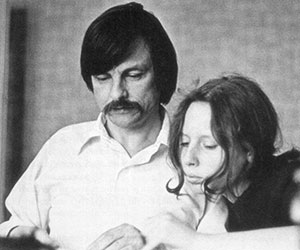
"Solaris", filmed after the novel by Stanislaw Lem, is very different from the original source. The novel is about the difficulty or impossibility of space contacts. In Tarkovsky's film the real issue is the human and the inhuman, the earth and the man. It is also about a man and his conscience. This film is about loneliness, and about overcoming it. "A man needs a man" - says one of the characters.
The most personal film by Andrei Tarkovsky is "Mirror". It was crafted from dear to him details and family memories. This is a story about how past and present merge. Originally the film was called "White Day" like the poem by Arseny Tarkovsky which is recited in the film.
When cinemas released the film "Stalker", the Zone, the place to which the main character leads people who hope that their wishes will be fulfilled, was only a fantasy. Today we see it as an accomplished prophecy of a huge trouble.
In April 1986 Chernobyl created a similar thirty-kilometer zone.
"Stalker" is an allegorical film. It is a reflection of the modern world. Mankind has put itself into a dead end, but you must have faith that it will be able to get out.
The film was based on the novel by Strugatsky "Roadside Picnic" but it is very different from the source.
The showing of "Sacrifice" almost coincided with the horrific events in Ukraine. All Western newspapers wrote that Tarkovsky foresaw nuclear disaster in Chernobyl, and the film is about it.
Tarkovsky's films are not just science fiction. They are mystery and poetry.
During the summer of 1979, Tarkovsky traveled to Italy, where he shot the documentary Voyage in Time, together with his longtime friend Tonino Guerra.
Tarkovsky returned to Italy in 1982 to start shooting Nostalghia. He did not return to his home country.
As Mosfilm withdrew from the project, he had to complete the film with financial support provided by the Italian RAI. Tarkovsky completed the film in 1983. Nostalghia was presented at the Cannes Film Festival and won the FIPRESCI prize and the Prize of the Ecumenical Jury. Tarkovsky also shared a special prize called Grand Prix du cinéma de creation with Robert Bresson. Soviet authorities prevented the film from winning the Palme d'Or, a fact that hardened Tarkovsky's resolve to never work in the Soviet Union again. In the same year, he also arranged the opera Boris Godunov at the Royal Opera House in London under the musical direction of Claudio Abbado.
He spent most of 1984 preparing the film The Sacrifice. At a press conference in Milan on July 10, 1984, he announced that he would never return to the Soviet Union and would remain in the West. It was a hard choice to make, because for his home country he would be a dissident, an outcast. And Tarkovsky loved his country, loved Russia with all his heart. However he felt that he couldn’t work in the Soviet Union, he hated censorship. Although he was the most famous Russian director he was always in debt, because he often was without work or paid very poorly. Many of Tarkovsky friends, however, think that Larisa Tarkovskaya influenced her husband to make such a decision.
At that time, his son Andrei Jr. was still in the Soviet Union and not allowed to leave the country. Andrei Tarkovsky suffered a lot, because he missed his beloved child. His friends tried all ways to help to reunite the family.
We can say that all the pictures belong to the genus director of "passion" - the ancient, medieval form of literature. The first was "The Passion According to Andrei" (this was at the beginning of the name of the movie), the latter was the painting "The Sacrifice." "The Passion" - a test of doubt, way of the cross of the human soul, which runs through temptation, death, loneliness, but overcome all the power of faith and love.
Tarkovsky's films always end with a chord of harmony, hope. Gorchakov, suffering hero of "Nostalgia", all obsessed with a strange ritual – to bring a candle from one end of the pool. He will carry his candle, and let it go out. The meaning of "nostalgia" is a lot deeper than the artistic expression of the idea of homesickness. This film - evidence of the great metaphysical nostalgia, which Andrei Tarkovsky wore in life itself.
During 1985, he shot the film The Sacrifice in Sweden. At the end of the year he was diagnosed with terminal lung cancer. In January 1986, he began treatment in Paris, and was joined there by his son, who was finally allowed to leave the Soviet Union. The Sacrifice was presented at the Cannes Film Festival and received the Grand Prix Spécial du Jury, the FIPRESCI prize and the Prize of the Ecumenical Jury. As Tarkovsky was unable to attend due to his illness, the prizes were collected by his son, Andrei Jr.
In Tarkovsky's last diary entry (December 15, 1986), he wrote: "But now I have no strength left - that is the problem". The diaries are sometimes also known as Martyrolog and were published posthumously in 1989 and in English in 1991.
Tarkovsky died in Paris on December 29, 1986. He was buried on January 3, 1987 in the Russian Cemetery in Sainte-Geneviève-des-Bois in France.
A controversy emerged in Russia in the early 1990s when it was alleged that Tarkovsky did not die of natural causes, but was assassinated by the KGB. Evidence for this hypothesis includes several testimonies by former KGB agents, who claim that Viktor Chebrikov gave the order to eradicate Tarkovsky to prevent what the Soviet government and the KGB saw as anti-Soviet propaganda by Tarkovsky. Other evidence includes several memos that surfaced after the 1991 coup and the claim by one of Tarkovsky's doctors that his cancer could not have developed from a natural cause.

